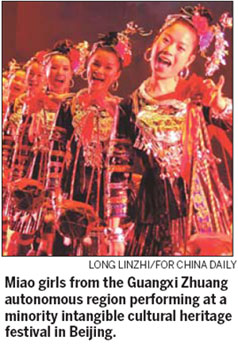|
A festival featuring 18 minority intangible cultural heritage performances is being held in Beijing till March 30.

Many of these shows involve 100 or so performers, who set out from their homes in the mountains or Gobi desert and spent several days traveling to Beijing.
Though backed by the government and widely reported, they are not getting much attention from the general public, partly because there are no tickets for sale.
Since it is government-backed and there is no box office pressure, organizers decided to make the performance "non-commercial", which means tickets are allocated to mostly officials, government workers and those in cultural circles.
Enriching the knowledge of our intangible cultural heritage to a selected audience prevents a wider audience being exposed to these treasures.
For example, friends who have traveled to many of the areas the performers come from and who are interested in the music and dances of these ethnic groups are willing to buy tickets to watch the shows, but they cannot.
Additionally, some of the seats in the theater will be empty because those who do have the tickets have little interest and will not show up.
It reminds me of the work of another friend, who is a concert organizer in Shanghai. He often puts on government-backed concerts, in which half of the tickets are for sale and half reserved for the sponsors. He has to be careful about distributing these complimentary tickets because he doesn't want whole areas of the theater to be empty, and thus prove embarrassing.

Though we have a market economy this type of attitude is a legacy of the planned economy era. In the past, workers and farmers used to go to films arranged by workers' unions and people's communes.
To promote minority culture through non-commercial performances is a good idea, as long as the right audiences are reached.
But perhaps a strategy of cheap prices would be more helpful, as a wider audience would be encouraged to attend. At the same time, complimentary tickets should be given to a smaller circle.
One of the richest countries in the world in terms of its intangible cultural heritage, China has done a great deal to document and preserve these works, but most of the video and audio documentation is limited to the use of governmental and academic organizations.
I haven't found a public library or archive where I can watch a video or listen to a recording of traditional culture and arts.
Make intangible cultural heritage accessible to ordinary people, if we really want to promote it, because its preservation depends on them.
(China Daily 03/19/2010 page18)
|



